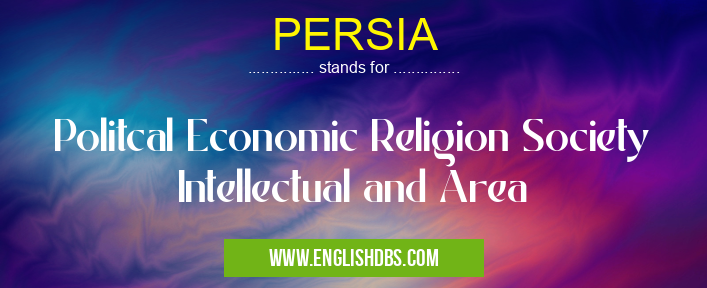What does PERSIA mean in RELIGION
PERSIA is an acronym that stands for Political, Economic, Religion, Society, Intellectual, and Area. It is a framework used to analyze and understand the complex dynamics of a region or country. The PERSIA framework provides a comprehensive approach to examining various aspects of a society, enabling a deeper understanding of its history, culture, and current state.

PERSIA meaning in Religion in Community
PERSIA mostly used in an acronym Religion in Category Community that means Politcal Economic Religion Society Intellectual and Area
Shorthand: PERSIA,
Full Form: Politcal Economic Religion Society Intellectual and Area
For more information of "Politcal Economic Religion Society Intellectual and Area", see the section below.
Political
The political aspect of PERSIA refers to the political system, government structure, and policies that govern a society. It examines the distribution of power, the role of political institutions, and the relationship between the state and its citizens. Understanding the political landscape is crucial for comprehending the decision-making processes and how they shape the society.
Economic
The economic component of PERSIA focuses on the economic system, resource distribution, and economic development of a society. It analyzes the production, consumption, and exchange of goods and services, as well as the factors that influence economic growth and inequality. A comprehensive understanding of the economic system provides insights into the standard of living, employment opportunities, and the overall prosperity of a society.
Religion
The religious aspect of PERSIA examines the belief systems, religious practices, and their influence on society. It explores the role of religion in shaping cultural norms, values, and social behavior. Understanding the religious landscape is essential for comprehending the spiritual and ethical dimensions of a society and its impact on daily life.
Society
The societal aspect of PERSIA deals with the social structures, social interactions, and cultural practices of a society. It examines the composition of the population, the family structure, social stratification, and the norms and values that govern social behavior. A thorough understanding of the social fabric provides insights into the dynamics of human relationships, community cohesion, and societal challenges.
Intellectual
The intellectual aspect of PERSIA focuses on the educational system, knowledge production, and intellectual achievements of a society. It examines the accessibility and quality of education, the role of research and innovation, and the contributions of scholars and artists to the society's intellectual development. Understanding the intellectual landscape sheds light on the society's capacity for critical thinking, innovation, and cultural advancement.
Area
The area aspect of PERSIA considers the geographical location, natural resources, and environmental conditions of a society. It examines the impact of geography on economic development, cultural exchange, and geopolitical dynamics. Understanding the physical environment provides insights into the challenges and opportunities faced by a society based on its geographical location.
Essential Questions and Answers on Politcal Economic Religion Society Intellectual and Area in "COMMUNITY»RELIGION"
What is the political system of Persia?
Persia was ruled by a monarchy, with the Shah as the supreme ruler. The Shah had absolute power and could make laws, declare war, and appoint government officials. The country was divided into provinces, each of which was governed by a governor appointed by the Shah.
What was the economic system of Persia?
Persia's economy was based on agriculture, with the majority of the population engaged in farming. The main crops were wheat, barley, and rice. Persia also had a significant trade network, with goods being exported to India, China, and Europe. The country's main exports included textiles, carpets, and precious stones.
What was the religion of Persia?
The official religion of Persia was Zoroastrianism, a monotheistic religion that was founded by the prophet Zoroaster. Zoroastrianism teaches that there is one god, Ahura Mazda, and that the world is in a constant struggle between good and evil. The religion also emphasizes the importance of good thoughts, words, and deeds.
What was the social structure of Persia?
Persian society was divided into three main classes: the upper class, the middle class, and the lower class. The upper class included the royal family, the nobility, and the wealthy merchants. The middle class included the farmers, artisans, and shopkeepers. The lower class included the laborers and slaves.
What was the intellectual culture of Persia?
Persia had a rich intellectual culture, and its scholars made significant contributions to the fields of mathematics, astronomy, and medicine. The Persian Empire was home to some of the world's greatest libraries, and its scholars were known for their knowledge and wisdom.
What was the geographical area of Persia?
The Persian Empire was one of the largest empires in history, stretching from the Mediterranean Sea to the Indian Ocean. The empire included the present-day countries of Iran, Iraq, Afghanistan, Pakistan, and parts of Turkey and Central Asia.
Final Words: The PERSIA framework is a valuable tool for analyzing and understanding the multifaceted nature of societies. By examining the political, economic, religious, social, intellectual, and area aspects of a society, researchers and policymakers can gain a comprehensive understanding of its complexities. The PERSIA framework facilitates informed decision-making, promotes cross-cultural dialogue, and contributes to the creation of more inclusive and sustainable societies.
